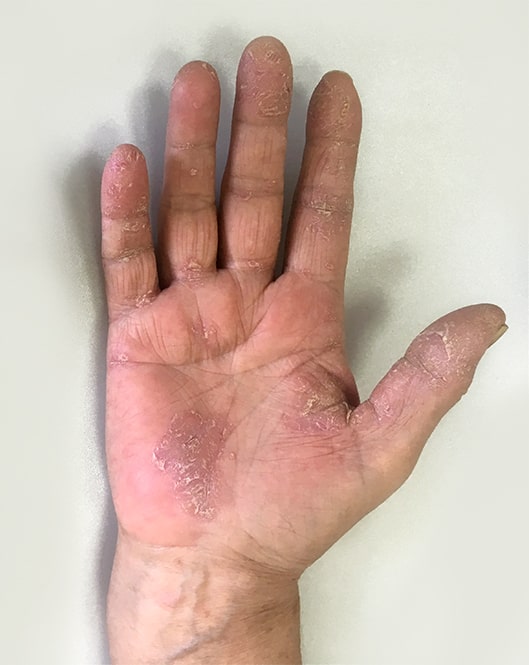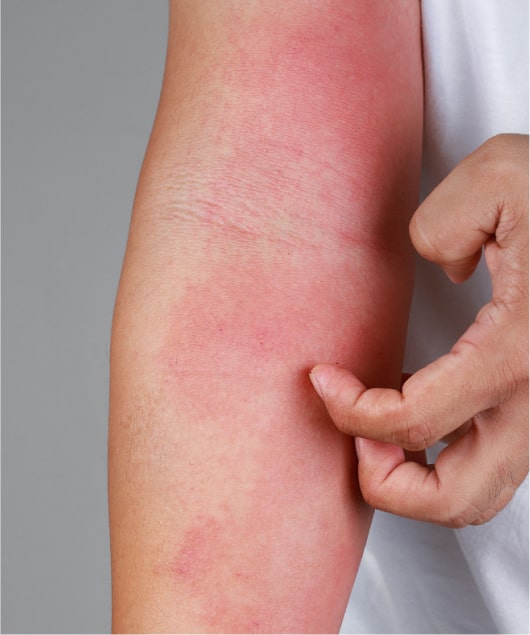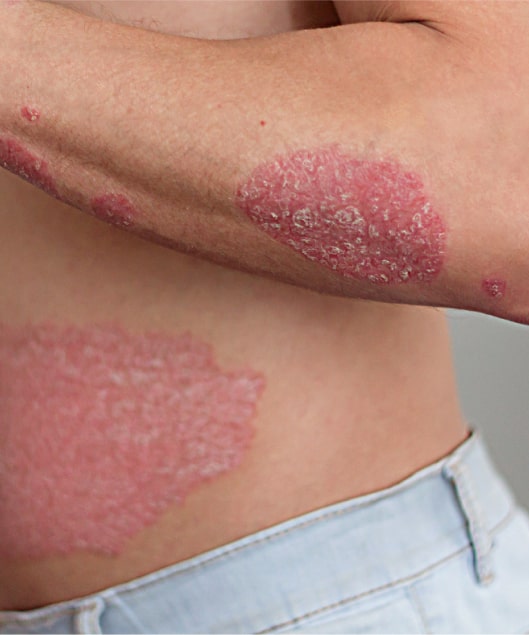The most common allergic skin diseases are urticaria, contact allergic and eczematoid dermatitis. Inflammatory and autoimmune skin diseases include psoriasis, vitiligo, atopic dermatitis, alopecia areata, and bullous skin diseases, lupus erythematosus, dermatomyositis and scleroderma.
Contact dermatitis is an inflammation of the skin that occurs in contact with various irritants such as nickel, cobalt, latex, detergents. Redness, swelling, blisters, scaling and itching occur at the point of contact.
Contact dermatitis can be treated with corticosteroid creams, and epicutaneous testing is important in detecting the causative agent. a u otkrivanju uzročnog agensa važno je učiniti epikutano testiranje.
After discovering the cause, that causative agent should be avoided in everyday life and work.


Other dermatitis caused by allergic mechanisms include nummular dermatitis, various forms of pruritus, and atopic dermatitis. Although atopic dermatitis is more common in children and usually disappears by the 4th or 5th year of life, less often, skin changes can also occur in adulthood.
Along with the marked dryness of the entire skin, redness, scaling and excoriations caused by scratching can be seen in the folds.
Milder forms of atopic dermatitis are are treated with local corticosteroid preparations and immunomodulators tacrolimus and pimecrolimus, while in severe forms it is necessary to introduce systemic immunosuppressive therapy, such as ciclosporin, methotrexate and new biological therapy with JAK inhibitors.
Inflammatory skin diseases include psoriasiswhich varies in severity from mild forms with several pink, scaly plaques on the elbows, knees and back to severe forms where the scaly plaques affect a large part of the skin and scalp, and changes occur in the nails and joints.
Psoriasis is a disease that today, thanks to modern immunosuppressive therapy and biological drugs, we can treat very well.
Among other inflammatory skin diseases, lichen planus is common, with smaller dull red changes that appear on the wrists and spread over the forearms, trunk and lower legs, and is treated with local and systemic corticosteroids, retinoids and phototherapy.

I am 23 years old and have had psoriasis since I was 16. Psoriasis is a disease that had a big impact on my life, especially in those crisis years of puberty. The frequent glances at the spots on my skin and inquiries about the disease were becoming more and more of a burden. For years I was trapped by red and scaly changes on my skin that increasingly began to affect other areas of my life. Every year, I would have an increasing area of skin affected by psoriasis, despite expensive creams, teas and even an attempt to treat with systemic therapy. I felt unhappy and trapped in my own skin, I started avoiding social contact with people due to discomfort. Because of psoriasis, I didn't wear the clothes I wanted, I didn't wear the hairstyles I wanted, and my nails were sick. Psoriasis disturbed my sleep, my sex life, the way I used my free time... After seven years of living with psoriasis, my path led me to Prof. Dr.Sc. Marije Kaštelan, who gave me the opportunity for another method of treatment. After a very short time, only a few examinations, a couple of findings that I needed, I was finally approved for treatment with biological therapy. The results were visible very quickly and led me to my final goal. The medicine is in the form of an injection for subcutaneous administration and I apply it every 12 weeks. What I have encountered so far, and this is not the case with the Skyrizi injection, are side effects. After receiving the medicine, I did not notice any side effects. Biological therapy brought back my life, healthy skin and a smile on my face. I want to tell all people and children suffering from this disease from the bottom of my heart to believe and not give up treatment.